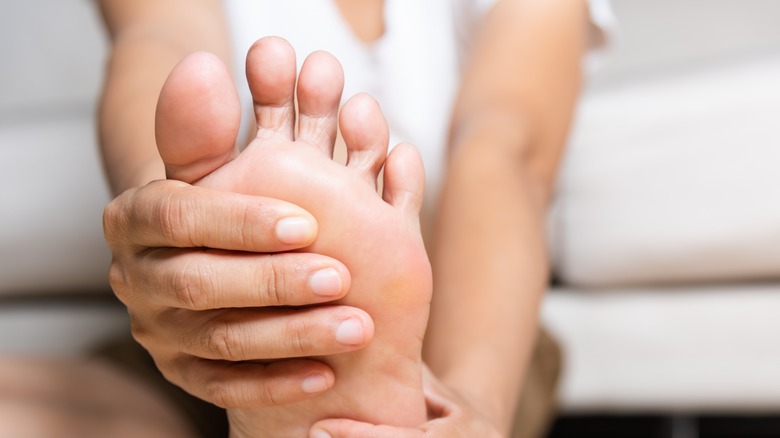Is Nail Fungus Contagious?
Nail fungus, also known as onychomycosis, is a fungal infection that affects the nails on the fingers or toes, per the Mayo Clinic. It is caused by a type of mold called dermatophyte, which can invade the nail bed and the nail itself. These fungi are the most common cause of nail infections, although other types of fungi and yeasts can be culprits as well.
When occurring on the toes, the condition is known as tinea unguium, and it affects many people worldwide, says the Cleveland Clinic. Indeed, approximately to 1 in 10 people may have toenail fungus. What's more, the incidence of the condition increases with age, affecting 50% of people over age 70. Generally speaking, nail fungus is more common in older adults and is more likely to occur in people with weakened immune systems or skin conditions like psoriasis, explains the Mayo Clinic.
The infection usually starts at the tip of the nail and may spread deeper — as it spreads, it can cause thickening, discoloration, and distortion of the nails. The infected nails may also become brittle and break easily. The infection can sometimes cause pain or discomfort, particularly when wearing shoes or walking. In severe cases, it can lead to permanent nail damage or even nail loss.
How contagious is nail fungus?
According to the Cleveland Clinic, nail fungus is contagious and can easily spread from one person to another. The fungus dermatophytes can be passed from person to person through direct contact, or when someone uses infected items or touches an infected object or surface. Because the fungus thrives in places that are damp and warm, areas like gym locker rooms or swimming pool decks are known breeding grounds. Therefore, people who walk barefoot in these kinds of environments might be more likely to get nail fungus.
Not only can nail fungus spread from person to object or person to person, but it can also spread on your body. For instance, it may spread from one nail to others, to the areas between the toes (where the infection is commonly known as athlete's foot), to the groin (jock itch), or to your scalp.
If you suspect you have nail fungus, you must talk to your doctor for diagnosis and treatment. Early treatment can help to prevent the infection from spreading and may improve the chances of successful treatment.
How is nail fungus treated?
According to the Mayo Clinic, the treatment for nail fungus typically involves antifungal medication, either as a topical cream or as an oral medication. In some cases, a combination of treatments may be necessary to effectively treat the infection. It's important to follow the instructions for use and complete the full course of medication, even if symptoms improve before the medication is finished. Your doctor may also prescribe a medicated nail polish like ciclopirox, which you'll need to apply on the infected nail once a day.
Curing your nail fungus is important to avoid spreading the infection to others. If you have nail fungus, avoid sharing personal items, and take protective measures such as wearing shoes in public showers and swimming pools. The Cleveland Clinic also advises to keep your nails clean and dry and avoid wearing tight-fitting shoes or shoes that don't allow your feet to breathe.



